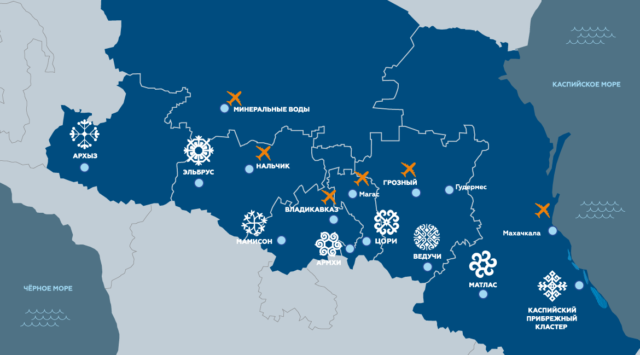
Kavkaz Files ISSN 2975-0474 Volume 21 Issue 1
Author: OSINT Team
The North Caucasus Federal District exhibits robust socio-economic development, as reported by Deputy Minister of Economic Development, Sergei Nazarov. Despite external pressures on the Russian economy, positive trends include a 17.2% increase in fixed capital investments, a 6.5% rise in real cash income, and a 1.2% decrease in the unemployment rate.
The comprehensive state program, “Development of the North Caucasian Federal District,” has significantly improved healthcare indicators, with notable advancements in life expectancy and infant mortality. The tourism sector is thriving, marked by a 16% increase in tourist flow to the region, reaching 1,524.7 thousand people.
Key Findings
- Fixed capital investments in the North Caucasus increased by 17.2%, driven by a notable surge in private investment (+27.0% by 2022), reaching 558.5 billion rubles.
- Real cash income rose by 6.5% in the third quarter of 2023 compared to the same period last year.
- The unemployment rate in the region dropped by 1.2 percentage points to 9.2% compared to the previous year.
North Caucasus’ Economy: Background Information
Deputy Minister Sergei Nazarov highlighted positive developments in the North Caucasus Federal District, including advancements in healthcare and tourism. Noteworthy achievements include increased life expectancy, decreased infant mortality, and a growing influx of tourists, reaching 5.4 million in January-October 2023.
Analysis
The effective implementation of the comprehensive state program, “Development of the North Caucasian Federal District,” has contributed to the socio-economic progress in the North Caucasus.
The surge in fixed capital investments reflects a favourable climate for private investors, indicating economic resilience despite external pressures. Positive trends in real cash income and reduced unemployment underscore the district’s economic stability.
The improvements in healthcare, particularly increased life expectancy and decreased infant mortality, showcase the positive impact of targeted state programs. Furthermore, the tourism sector’s growth, supported by diverse offerings from skiing to cultural and beach tourism, signifies the region’s attractiveness and potential for economic diversification.
The ongoing “Great Caucasian Trail” project demonstrates the commitment to sustainable tourism development, fostering connectivity across regions and adhering to unified standards. Collaborative efforts with protected areas and regional agreements indicate a comprehensive approach to tourism infrastructure development.
Risk Assessment
While the North Caucasus Federal District demonstrates resilience, potential risks include external geopolitical influences and the need for sustained economic stability. The region’s dependency on tourism growth demands careful management to avoid overreliance on a single sector. Additionally, monitoring external pressures on the Russian economy remains crucial for sustained development.
Russian authorities must acknowledge the potential risks to the North Caucasus, including external pressure from North Caucasians residing abroad, particularly in Ukraine, where a network of movements advocates for regional self-determination and separatism from the Russian Federation.
If Moscow will fail in providing local development, economic decline may exacerbate local discontent, potentially leading to instability, ethnonationalist movements, or the emergence of terrorist groups in the region.
Scenarios Analysis
- Optimistic Scenario: Continued implementation of state programs and successful tourism development lead to sustained economic growth and increased regional stability.
- Moderate Scenario: Economic growth faces challenges because of external pressures, requiring adaptive strategies to mitigate risks and maintain positive trends.
- Pessimistic Scenario: Geopolitical tensions escalate, affecting the Russian economy and subsequently hindering the North Caucasus Federal District’s socio-economic development.
Conclusion/Recommendations
In conclusion, it is noteworthy to commend the North Caucasus Federal District’s positive socio-economic trajectory. In order to ensure ongoing success, it is advisable for the region to diversify its economic foundation, scrutinise geopolitical developments, and adopt adaptive strategies to navigate potential challenges. To ensure continued success, the region should prioritize sustainable tourism development for long-term economic resilience, as seen in the “Great Caucasian Trail” project.
For those with an interest in acquiring comprehensive insights into the economic and political dynamics of the North Caucasus, we encourage you to reach out to our team by sending an email to info@specialeurasia.com. We are poised to facilitate an assessment of the opportunity for you to obtain a meticulously crafted and specialised report tailored to your intelligence needs.



